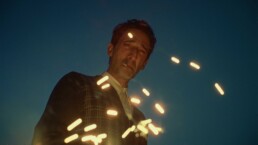'A Complete Unknown' Review: The Rise of a Cultural Disruptor
What happens when you get one of the most in-demand (some may argue currently oversaturated) actors to play an enigmatic legendary musician? Director James Mangold makes this incredible challenge look easy in his latest biopic, A Complete Unknown. Timothée Chalamet is electric as the rebellious nobody turned American folk hero Bob Dylan. Chalamet defies naysayers' assumptions as he channels Dylan's defiance and creative genius through spellbinding performances that vividly capture the revolutionary musical awakening of the 60s. While the film still has its blemishes, it's an easy Best Actor nomination for Chalamet come Oscar season.
From a Rolling Stone to Folk Icon
A Complete Unknown charts the meteoric rise of Bob Dylan's spectacular and complicated career. Based on the novel Dylan Goes Electric!: Newport, Seeger, Dylan, and the Night That Split the Sixties by author Elijah Wald, the film captures a short but substantial period of Dylan's early life. Bob Dylan (Chalamet) arrives in New York City with nothing more than an acoustic guitar and a dream. The year is 1961 and the 19-year-old from Minnesota is eager to make a name for himself. His confidence and singular talent catch the attention of Pete Seeger (Edward Norton) who swiftly takes Dylan under his wing.
Seeger is eager to introduce Dylan to the wider NYC music industry. He knows full well that what Dylan harnesses is something special. Acting as his manager, Seeger sets up various showcases around Greenwich Village. Instantly, audiences are captivated by Dylan’s poetic and dagger-like lyrics and unique sound. He catches the eye of another folk darling, Joan Baez (Monica Barbaro), and they go on to have a sporadic but highly passionate and rocky relationship. His romantic life is one of disarray as he also juggles his on-again, off-again relationship with Sylvie Russo (Elle Fanning).
Dylan Goes Electric!
Bob Dylan's revolutionary talent came with its fair share of controversy. After years of playing traditional folk-inspired songs, Dylan feels compelled to explore the new sound of the 60s: electric. Everything culminates on the day of the 1965 Newport Folk Festival. At this point, he is bored of playing his hit songs and is determined to shake things up, much to the concert promoters' and audiences' dismay. Never one to stray from his authenticity, Dylan plugs in and ends up playing a groundbreaking performance that changes the trajectory of his career–and folk music–forever.
Timothée Chalamet Deserves a Standing Ovation
The film's biggest source of awe is undoubtedly the pitch-perfect performance by Timothée Chalamet. Chalamet not only physically embodies the scrawny songwriter, but he also belts the songs and plays the guitar and harmonica with incredibly detailed precision. He performs for nearly half of the movie, at times it seems as if there are more songs than dialogue. Every song, from "A Hard Rain’s A-Gonna Fall" to "Like A Rolling Stone" to "Girl From The North Country", is spellbinding. Monica Barbaro as Joan Baez is equally impressive. Her rendition of "House Of The Rising Sun" and "It Ain’t Me, Babe" are emotionally compelling and just plain fun to listen to.
Despite Powerful Performances, Mystery Remains
A Complete Unknown is not a perfect film. The biggest source of frustration comes from the script not going into enough depth about Dylan's mysterious life pre-NYC. Little nuggets intended to pique our interest are never fully addressed. For example, we see an envelope intended for Bob Dylan but it's addressed to a moniker we've never heard before. Perhaps a future documentary can explore more details about his early life. However, in A Complete Unknown, these moments should have either been addressed or cut altogether. Aside from the riveting performances, which is why this film is worth seeing in theaters, Mangold's biopic leaves much to be desired about the mysterious early life of this icon.
Takeaway
Fans of Bob Dylan should feel optimistic about A Complete Unknown. Timothée Chalamet exceeds expectations and delivers one of the most unforgettable performances of the year. Dylan's music has been attributed to bridging the gap between genres and generations. Similarly, A Complete Unknown is a film for everyone: every age and musical preference, especially those with a rebellious spirit.
'The Room Next Door' Review: A Bold Statement on Life and Death
Pedro Almodóvar's English-language feature debut is a stylish albeit strained saga of reconnection amid tragedy. Based on the novel What Are You Going Through by Sigrid Nunez, The Room Next Door gives glimpses of strength in its beautiful production design and enviable wardrobes. Still, strong visual aesthetics ultimately don't make up for a soft script. Even Tilda Swinton and Julianne Moore's star power can't stop this drama from nearly flatlining.
An Overdue Reunion Sparks Joy and Sacrifice
Ingrid (Moore) is a best-selling author whose career is flourishing, as evidenced by her sold-out book signing event. She gets a sobering reality check after learning that her once-close friend Martha (Swinton) is in the late stages of cancer. Despite not seeing each other in some time, Ingrid feels called to visit Martha in the hospital. Ingrid's presence is the greatest gift to Martha, who welcomes her back into her life with open arms.
We learn that Ingrid and Martha were colleagues-turned-friends from when they worked for the same NYC magazine. Their lives eventually led each down a different path. Ingrid pursued writing and Martha became an on-the-ground war correspondent. The women were gradually separated by circumstance, until now. Perhaps it's Martha's persuadable personality, or maybe it's Ingrid's desire to please, but the women quickly become inseparable. Martha appreciates this quality time, and eventually asks Ingrid the most unexpected yet important question of the relatively short time she has left: will she accompany Martha upstate and keep her company until she decides to end her life?
In Sickness and in Health
It's a bizarre situation that Almodóvar infuses dark humor into to relieve the grief. Ingrid agrees to Martha's final wish, despite her obvious and repeated statement that she's "terrified of death". The house upstate is gorgeous and, ironically, beaming with life due to its proximity to nature. The film's second half takes place primarily in this architecturally stunning wonderland that borders the dimension between life and death.
Tilda Swinton Makes it Impossible to Look Away
Tilda Swinton gives a staggering performance as Martha. She comes alive as she exaggeratedly retells stories from her deathbed, which usually includes flashbacks and (frankly unnecessary) reenactments. Swinton embodies Martha's vulnerability so delicately that it's hard to look away anytime she is on screen. I wish I could say the same about Julianne Moore's Ingrid, although that's not entirely her fault. Ingrid is written so one-dimensionally and flat, there isn't much for Moore to work with until the film's end. Ingrid acts primarily as a sounding board and even therapist for Martha. She is never given a personality of her own.
The biggest question that is never really answered is why Ingrid feels the need to put her life on pause while she essentially acts as Martha's hospice BFF. Her career is taking off and it can be argued that, while it's incredibly generous to step away to care for a loved one, the two women hadn't been close in years. Decades even. The motivation is never fully revealed.
The Almodóvar Color Palette Doesn't Disappoint
Fans of Almodóvar will be pleased to know that his signature style of bold colors and breathtaking visuals are all over The Room Next Door. The color red is nearly in every scene, whether it be a car, coat, purse, or lipstick. When we first meet both women, Ingrid wears a bright red sweater. Martha is dressed in a muted red top. Their varying shades of red, the color of passion and vitality, seem to ultimately foreshadow their fate. Almodóvar's frequent collaborator, composer Alberto Iglesias, reteams with the director again here. While the score is emotive and large-scale, it feels oversaturated and conflicting in certain scenes. Ultimately, it is more distracting than a helpful storytelling device.
Takeaway
The Room Next Door is not Almodóvar's finest work, but it offers a unique perspective on an unconventional life journey. The film's message of accepting and living with tragedy is a very personal one, I'm sure it will resonate differently with everyone who views it.
'The Brutalist' Review: Brady Corbet's Defiant, Fiery Magnum Opus
In 2018, actor-turned-filmmaker Brady Corbet turned heads with his sophomore feature, Vox Lux. The Natalie Portman-led dark musical harnessed an uncompromising vision that, at the time, felt exciting and fresh. It was a bold introduction to his aesthetic and unique visual style as an artist. In his latest film, The Brutalist, Corbet doesn't so much turn heads as he does command the room. A larger-than-life story about an architect who immigrates to America with nothing more than a dream, The Brutalist is a defiant, fiery magnum opus whose enduring appeal will withstand the test of time.
The Immigrant Experience Mirrors the Artistic One
Adrien Brody plays the fictional character László Toth, a visionary Hungarian-Jewish architect who finds refuge in America from his war-torn homeland in Eastern Europe. Famed for his stunning brutalist structures in his native Budapest, the ongoing political struggle has forced him to flee and temporarily leave his wife Erzébet (Felicity Jones)and niece Zsófia (Raffey Cassidy) behind.
Once in America, Pennsylvania to be exact, László is greeted warmly by his cousin who eagerly gives him a job at his modest furniture shop. While there, he meets the bullish and egotistical Harry Lee (Joe Alwyn) and his wealthy aristocratic and industrialist father Harrison Lee Van Buren Sr. (Guy Pearce). Harrison is transfixed by László's constructions, and he presents the talented designer with a life-changing opportunity. Harrison commissions László to build a dynamic modernist monument that will forever be etched into the fabric of the American landscape.
This is László's golden ticket. Steady work guarantees he can bring his wife and niece to America and give them a better life. He begins construction on the large-scale structure and it all seems to be going according to plan. However, with mounting pressure from Harrison and the weight of isolation finally starting to crack László's tough exterior, he begins to spiral. Even with his wife and niece by his side, László realizes just how quickly the American dream can turn into a nightmare.
"It’s not the journey, it’s the destination."
There is an ongoing theme throughout The Brutalist which shows an artist's sacrifice in order to execute their vision. No doubt the parallels between László and Corbet are strong, as the filmmaker spent seven years crafting and perfecting his vision. His patience has more than paid off. The Brutalist won five awards during its World Premiere at the Venice Film Festival, including the Silver Lion honor of Best Director.
Filming in VistaVision, which Alfred Hitchcock employed in North by Northwest and Vertigo
For its humble budget of $10 million, Corbet & company easily make The Brutalist look and feel like it had a $40-$50 million budget. It's worth noting that, according to online statistics, A24's average production budget for films in 2023 was $15.36 million. The scope of this film is monumental, from the expansive sets to the period costumes and the actual story itself. Corbet further accentuates László's world by capturing the film in VistaVision, a high-res, widescreen variant of the 35 mm format.
The handheld opening sequence immerses the viewer into feeling like they were in László's shoes. This intimate and personal experience is jarringly effective, amplified by the dissonant score from composer Daniel Blumberg. The film offers a mix of handheld and steady shots, delicately framed by cinematographer Lol Crawley. His use of lighting and shadow play gives every frame a museum-quality depth which is aptly fitting for a film about an artist.
Takeaway
Running over three and a half hours long, with one smartly placed 15-minute intermission, The Brutalist is a profound cinematic achievement by all involved. From the stunning title cards to the rich performances that will no doubt be the talk of awards season, The Brutalist is a psychologically introspective and intellectually stimulating stroke of genius.
'Nickel Boys' Review: An Experimental Filmmaking Triumph
By far the most stunning film I saw at AFI FEST was RaMell Ross' spellbinding immersive feature Nickel Boys. Two years after debuting his documentary, Hale County This Morning, This Evening, the Academy Award-nominated director shifts into the scripted space with a beautiful sense of purpose and finesse. Based on the Pulitzer Prize-winning novel "The Nickel Boys" by Colson Whitehead, Ross' film adaptation brings the emotionally dense pages to life in the most remarkable and moving of ways.
What Happens
Nickel Boys explores the budding friendship between two young men who fight to survive within Nickel Academy. The prison-like school is a brutal all-boys reformatory program located deep in the Jim Crow South. Seen mostly through first-person POV, the audience is instantly immersed in the harsh realities that Elwood (Ethan Herisse) and Turner (Brandon Wilson) experience daily. Their struggles and hardships are viewed within an arms reach, it is impossible to absorb their stories without incredible intimacy.
Elwood is more reserved than Turner, whose confidence offers Elwood a sense of comfort, even if that confidence may be wavering. Despite Nickel’s brutality and unrelenting treatment of the black boys held captive, Elwood and Turner strive to find the silver lining even in the darkest of times. Running two hours and twenty minutes long, Nickel Boys requires some commitment from the audience to stay engaged. However, this is not a tall order, as it is easy to get immediately entrenched in the film's gripping storyline.
Takeaway
Nickel Boys is a mesmerizing form of storytelling imagined by director RaMell Ross. He is a standout visionary and the result is an unforgettable cinematic experience. Further commanding the screen is the achingly delicate score by composers Alex Somers & Scott Alario. Their sonic interpretation of the story is gentle yet powerful. It will no doubt stir up feelings of melancholia inside every viewer. From top to bottom, Nickel Boys is phenomenal filmmaking.
Nickel Boys opens in select LA theaters on December 20 before expanding to additional markets in the subsequent weeks.
This review originally ran on November 5, 2024, during AFI FEST.
Composers Scott Alario, Alex Somers Debut Track From 'Nickel Boys'
Your ears haven't heard anything like this before. Quite possibly the most resonating score I've listened to all year, co-composers Scott Alario and Alex Somers conjure up nothing short of magic in their stunning experimental soundtrack for Nickel Boys. The film already plays with strong stylistic choices, including the use of the first-person POV perspective, and Alario and Somers propel this intimacy with their ethereal and often hypnotic sound. It's easy to listen to and impossible to forget.
Based on the Pulitzer Prize-winning novel by Colson Whitehead, Nickel Boys chronicles the powerful friendship between two young African American men navigating the harrowing trials of reform school together in Florida. It stars Ethan Herisse, Brandon Wilson, Hamish Linklater, Fred Hechinger, Daveed Diggs, and Aunjanue Ellis-Taylor. Amazon MGM Studios is giving a limited release on Friday, December 13th.
Cinemacy is proud to premiere “Stare” from Nickel Boys (Original Motion Picture Soundtrack), below:
The score's initial texture is incredibly visceral as if one is recalling a hazy memory that intermittently comes in and out of consciousness. It almost sounds like a struggle, until we get about two minutes in and are greeted with warm rays of light. The stickiness of the first two minutes beautifully comes to a crescendo moments later. Somers' vocals push through the wall of sound to create an angelic and emotive rallying cry. During Deadline's "Sound & Screen" music showcase in November, Alario and Somers explained how they found inspiration on set in New Orleans. RaMell Ross encouraged them to explore the unconventional. The result is an artful and unique blend of bathroom fans, frogs, and more.
Nickel Boys is having a good week. In addition to the upcoming soundtrack release, RaMell Ross won Best Director at the Gotham Awards and the New York Film Critics Circle Awards. Brandon Wilson, who plays Turner, took home Gotham's Breakthrough Performer award. Announced yesterday, the film is also nominated for a Film Independent Spirit Award for Best Feature. Cinematographer Jomo Fray is also nominated for a Spirit Award.
About Alex Somers
Alex Somers is an American composer and music producer. After studying at Berklee College of Music, Alex relocated to Reykjavík, Iceland where he attended the Iceland Academy of the Arts. In Reykjavík, Alex honed his skills as a composer, producer, audio engineer, and mixer. Alex now lives in Los Angeles and creates music for film and TV. Recent projects include: Honey Boy, Captain Fantastic, Nickel Boys, Holland Michigan, Taylor Swift Miss Americana, The Biggest Little Farm Series, Causeway, Sigur Rós Valtari, and Jónsi & Alex Somers - Riceboy Sleeps.
About Scott Alario
Scott is an artist and composer living and working in Providence, RI. He makes music as a solo artist (Sorry I’m Late, 2022) and as a collaborator with LA-based composer Alex Somers, since 2003. The two co-scored (with Forest Kelley) the 2019 Oscar-nominated documentary film Hale County This Morning, This Evening (2018, directed by RaMell Ross).
Lakeshore Records will release 'Nickel Boys (Original Motion Picture Soundtrack)' on Friday, December 6th.
'Nightbitch' Review: She's Not a Regular Mom, She's a Dog Mom
Amy Adams isn't a regular mom, she's a dog mom in Marielle Heller's absurd body horror tale, Nightbitch. Based on the 2021 novel by Rachel Yoder, Nightbitch tells the story of a sleep-deprived and spiraling stay-at-home mom whose suburban life is upended after succumbing to her feminine rage. Equal parts disturbing and empowering, Nightbitch pushes the boundaries of the bizarre in truly unforgettable ways. Whether or not it fully lands is debatable.
Parenthood is a Mother
Amy Adams stars as the ambiguously named Mother. Her life has become repetitive a Groundhog Day caring for her toddler son while her husband (Scoot McNairy) travels for work. Once a prominent artist, her days are now filled with mommy & me classes, mediating tantrums, and the occasional opportunity to shower. One day, she notices something weird, a long rogue hair sprouting from her chin. Thinking it's a result of wacky hormones, she plucks it and forgets about it.
As more days pass, she can't ignore the bizarre physical transformation that is taking place right in front of her eyes. In one of the film's most visceral and disgusting scenes, puss literally oozes out of her lower spine, and the tip of a tail begins to form. It's an experience as painful for Mother, as it is for us to watch. The climax comes when she realizes that, in addition to the physical similarities she begins to share with the neighborhood dogs, she now has a spiritual connection too.
While on the surface this may come across as trite, the deeper meaning is rather alluring. The concept is that a woman's animalistic charge is reborn with childbirth, and prehistoric maternal instinct is forever strongly grounded in our ancestral DNA. Women create life and therefore should be as revered as a god. Not exploited and dismissed as many new moms feel.
A Film That Understands and Empathizes with Feminine Rage
Nightbitch does reinforce tropes that seem a bit stereotypical, such as the clueless man and the overworked and underappreciated stay-at-home mom. However, director Marielle Heller encourages a more provocative conversation surrounding the regret of becoming a mother in a non-shameful way. Driving this point home, Amy Adams delivers a breathtaking monologue about feeling insignificant. She eloquently articulates the bodily and mental sacrifice that has contributed to the death of the woman she once was. Nightbitch does offer a place for those struggling to feel seen. It pulls the curtain back on some of the most vulnerable emotions a new mother can experience.
Takeaway
Nightbitch premiered at the Toronto International Film Festival and has four wins and one nomination. While grotesque in a handful of moments, the film does strike a balance between dark comedy and surreal horror. Viewers may be surprised by the amount of humor within the film, especially in any scene involving her toddler (Arleigh Snowden). He is quite the scene stealer. As a whole, Nightbitch is an impressive vehicle for Amy Adams to go all in on a character. There are echoes of Demi Moore's character arc in The Substance (for those who enjoyed that absolute spiral). While this film is mostly a riot to watch, ultimately, Nightbitch fails to have staying power. It does, however, serve as effective birth control for anyone thinking about having kids.
'Breakup Season' Review: A Couple's Not-So-Merry Christmas Story
"Ho ho ho" turns into "No, no, no" in filmmaker H. Nelson Tracey's debut feature, Breakup Season. Arriving just in time for the holidays (on VOD Friday, December 6), this indie dramedy tells the story of a young couple's ill-timed split during the most wonderful time of the year. In his winning directorial debut, Tracey cleverly combines a coming-of-age story over Christmas and captures a broad spectrum of deeply felt human emotions, making for a humorous, heartwarming, and crowd-pleasing delight.
A Young Couple's Unconventional Christmas Story
What should be a memorable moment meeting her boyfriend's family quickly becomes a nightmare scenario for Cassie (Samantha Isler, Molly’s Game, Captain Fantastic), who finds she must navigate her fragile relationship while staying with them over Christmas. Arriving with her excitable boyfriend Ben (Chandler Riggs, The Walking Dead) in his rural hometown in La Grande, Oregon, Cassie puts on a happy face to embrace his lovely family, who all welcome Cassie with open arms. There's Ben's quirky dad, Kirby (James Urbaniak), his loving mom, Mia (Brook Hogan), and his aspiring influencer younger sister, Liz (Carly Stewart), who live streams the entirety of the events.
However, Ben's older step-brother, Gordon (Jacob Wysocki), disrupts the cheer with an antagonizing interrogation of Cassie over dinner, unknowingly breaking the final straw in her and Ben's relationship. Cassie tearfully tells a heartbroken Ben that things aren't working and that it's best if she leaves the next morning to go home. However, the weather has other plans, and the next morning, all flights are grounded until after Christmas–leading Cassie to realize that she must spend the rest of her holiday with her now ex-boyfriend and his family.
Balancing Empathy and Entertainment On Screen
With its nuanced balance of comedy and drama, Breakup Season captures the highs and lows of love in your early 20s. Emotionally honest and astutely observed, H. Nelson Tracey's poignant script allows audiences to understand Cassie and Ben's perspectives on their unfortunate situation, making for an empathetic experience. Bringing these dynamic characters to life are Samantha Isler and Chandler Riggs, who deliver powerful and authentic performances that ground the viewer in dread, regret, and longing.
With his singular brand of comedy, Jacob Wysocki steals the show as the boisterous older brother Gordon, even impressing in the film's dramatic turns. And then there's the very location of La Grande, Oregon itself, which one could say also plays a supporting character. With much admiration for its community, spirit, and beauty, Breakup Season also shows why this real-life small town is worth visiting.
Takeaway
If you're in a movie rut this holiday season, put Breakup Season at the top of your watchlist. This smart, funny, heartfelt indie dramedy that captures everything about young love is an incredible accomplishment for filmmaker H. Nelson Tracey (a promising young talent whose career we're excited to continue following) and for all involved (including the up-and-coming production company Static Films). Breakup Season truly is a gift that will keep on giving for many seasons to come.
'Bajo La Tierra' Review: A Meditation on Regret and Moving Forward
A young woman is forced to reprioritize her life in filmmaker Pablo Guillen's supernatural short film, Bajo La Tierra. This independent film takes an empathetic look at a daughter's devastation after learning of her mother's passing. It's easy to put off spending quality time with loved ones when there is an expectation that you will see them at a future date. Pablo Guillen reminds us that this permanence is never guaranteed, and meaningful relationships should always come before extracurricular obligations.
On Spending Time With Loved Ones Before It's Too Late
Bajo La Tierra transports the audience to a small isolated ranch in Alta, California. The year is 1845 and Alma (Susana Elena Boyce), a young woman in her early 20s, is determined to lift herself and her mother out of poverty. When Alma was young, she promised her mother Josefa (Ivette González) that she would someday buy them a house in the neighboring metropolitan city. Now an adult, Alma remains determined to keep her promise albeit to an unhealthy degree. Alma is a skilled pottery maker who, every day, is becoming more consumed with her work. Her intentions to make and sell her products are good but she repeatedly prioritizes her business over spending time with her mother. This is a decision she will soon come to regret.
One night, Alama receives word that her mother has tragically passed away. This sends her into a spiral, her mother's death only fuels her need to stay busy. She purposefully buries herself in her work to avoid the pain of her reality. Alma's pottery obsession quickly turns toxic as guilt and remorse flood her thoughts. Just as Alma reaches her breaking point, she begins to experience a series of supernatural occurrences that force her to truly examine the present moment. At this point in her grief journey, Alma realizes that it's up to her to regain control of her life. The alternative is a sad existence of regret, denial, and shame.
Rich is Visual Aesthetics
Pablo Guillen's Bajo La Tierra is a beautifully crafted short film that is rich in visual aesthetics. Close-ups of dirt and Alma's meddling hands give the film an intimacy that grounds the viewer in the story. The setting and production design are top-tier, as is the acting. Susana Elena Boyce's performance as a grieving Alma carries an emotional charge that lights up the film through its realistic and surreal moments.
Takeaway
Bajo La Tierra comes from the AFI Conservatory, indicating a strong emphasis on storytelling and craft. The short film already has 3 wins and 6 nominations to its name, including a BAFTA/LA Student Film nomination for 'Best Live Action'. Director Pablo Guillen understands how to create a unique and compelling story, and Bajo La Tierra is proof of his successful vision.








